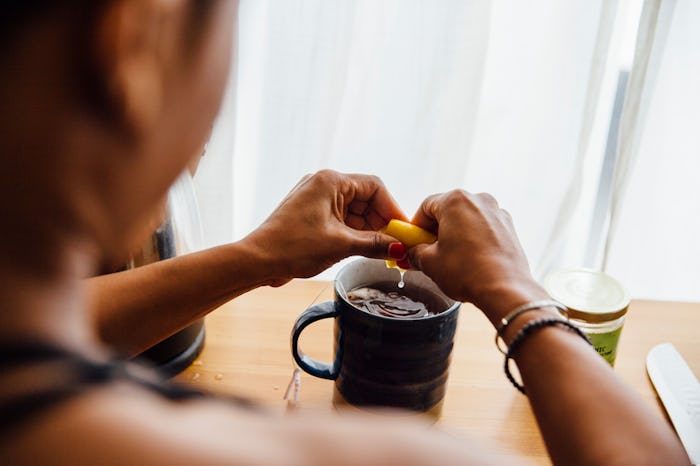Food

Here's What The Experts Have To Say About Tea Vs. Coffee During Pregnancy
Whether you’re pregnant while parenting a toddler or you're trying to shake that first trimester fatigue, chances are at some point (or, you know, every day) you’re going to want some caffeine to help you make it through the day without falling asleep. You may be wondering, is tea better than coffee during pregnancy? As it turns out, it’s not so much about what you’re drinking, and more about the amount of caffeine you’re consuming per day.
“While teas generally contain less caffeine than coffee, it remains important to ensure that you limit the amount you consume daily,” Dr. Angela Jones, M.D., FACOG (who goes by Dr. Angela) tells Romper. “The American College of Obstetrics and Gynecology recommends consuming no more than 200 milligrams of caffeine daily. It’s easy to drink more tea thinking that it’s safer than coffee because it generally contains less caffeine, but remember, it adds up.”
So if you’re a quantity person and enjoy having more than one cup per day, tea may be a better choice simply because most blends contain less caffeine than coffee. “Black tea tends to be the most caffeinated of all teas, and green tea or herbal teas tend to have the least, or no caffeine at all,” Dr. Lucky Sekhon, fertility specialist and board certified OB/GYN in New York City tells Romper.
So what does 200 milligrams of caffeine really look like? “[It’s] the equivalent of a 12 ounce cup of coffee per day,” Dr. Angela tells Romper. But keep in mind, the amount of caffeine can vary widely by blend.
For example, a tall size (the small one) of Nitro Cold Brew from Starbucks clocks in at 215 milligrams of caffeine, which will instantly put you over your recommended daily limit. The average cup of black tea, on the other hand, contains anywhere between 47 and 90 milligrams, per Healthline; this range in caffeine depends both on how long the tea steeps and the brand. But before you swear off your favorite coffee shop, remember, “you can always order decaf, which is usually 97% caffeine free,” Ilyse Schapiro, RDN, tells Romper. “If you’re looking for a caffeinated option, just ask the barista how beverages are prepared. An espresso shot usually has about 45 milligrams of caffeine, while a drip coffee can have up to 95 milligrams. It’s always safer to opt for a latte or cappuccino with a single shot of espresso than getting a drip or cold brew coffee.” Both Dr. Sekhon and Dr. Angela echoed this exact thought; decaf is safest, followed by a drink made with a single espresso shot.
It turns out that traces of caffeine can be found in amniotic fluid, umbilical cord, urine, and plasma of fetuses, according to a 2015 study where researchers suggested that caffeine can be “easily transmitted across the placenta.” Pregnancy also causes you to metabolize caffeine at a slower rate, so the good news is that even with less, you may feel the perked-up effects for longer (and if you have the patience, you can also sip your beverage more slowly to savor the moment and slow down its effects).
And before you reach for a comforting cup of herbal tea, Dr. Angela says that while they may be considered "safe" in the sense that herbal blends don't contain caffeine, it’s important to check with your OB/GYN about which ones may or may not be pregnancy-safe as "some contain components that can have adverse effects in pregnancy [including} fennel, borage, licorice, and motherwort, to name a few."
"It's safest to avoid consuming any herbs in amounts greater than you would usually consume it or adding a new herb to your diet during pregnancy," Schapiro tells Romper. "While most teas should be avoided, some are safe. They include raspberry leaf, peppermint, ginger, and lemon balm tea. However, it's always best to consult with a physician before adding any herbal tea to the diet."
If you're still feeling concerned about your coffee or tea intake, you could try using a caffeine calculator, but one of the simplest ways to keep track is to research the amount of caffeine in your blend, keep your cup to 12 ounces or less, and use a measuring cup to pour that exact amount into your mug (you can use the full one-cup measuring cup). You may be pleasantly surprised by what 12 ounces actually looks like.
Studies Referenced:
Rhee J, et al. (2015). Maternal Caffeine Consumption during Pregnancy and Risk of Low Birth Weight: A Dose-Response Meta-Analysis of Observational Studies. PLOS ONE Journal. doi: 10.1371/journal.pone.0132334
Experts:
Dr. Angela Jones, M.D., FACOG, board certified OB/GYN
Ilyse Schapiro, RDN, registered dietician
Dr. Lucky Sekhon, M.D., fertility specialist and board certified OB/GYN in New York City
This article was originally published on